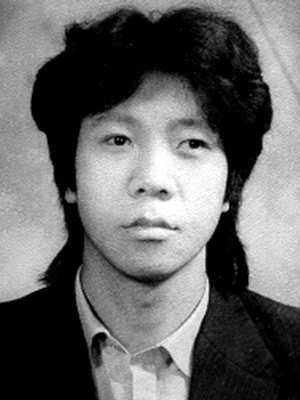Male, 24, staff member at the bathhouse of Beijing Tianqiao Nantong Service Building. From: Beijing.
On the night of June 3, 1989, at the no. 15 bus terminal near Tianqiao, Liu encountered airborne troops coming from the south who were firing indiscriminately. Liu was shot in the head. He was brought to Beijing Friendship Hospital and died on the morning of June 4. The death certificate issued by the hospital said: “Heart and respiratory failure caused by gunshot to the head.” Liu’s remains are buried in Tong County in Beijing.
Liu’s mother lost her husband years earlier to illness and raised her two children on her own. After Liu¬—the younger of her sons—had died, her older son lost his mental faculties from the shock of his brother’s death. Liu’s mother suffered from prolonged depression and eventually died of cancer. After her death, her older son died from gas poisoning.
Liu’s mother, Sun Xiuzhi (孙秀芝), and older brother, Liu Chunlin (刘春林), were both members of the Tiananmen Mothers before they passed away.

Liu Chunyong’s older brother, Liu Chunlin, witnessed the bloody massacre with his own eyes. The unfortunate death of his younger brother had a devastating impact on him, and he was unable to accept that cruel fact. In the following 18 years, he remained mired in an inescapable fear and unresolved guilt. He regretted his failure to protect his brother who was ten years younger than him. He lost his mental faculties for a time. Even afterwards, the condition reemerged from time to time. In the end, it became a chronic a psychiatric illness that was hard to cure, leaving him nearly unable to make a living.
Liu’s mother, Sun Xiuzhi, was just an ordinary housewife raising the kids at home, cooking meals for the family, and tending to chores. In 1970, her husband had a heart attack and died suddenly, leaving her with two sons. She was only 36 then, with an elder son in secondary school while the younger was only three years old. With the sole income of the family gone, life was difficult. Later, her husband’s unit took her in as a worker in the factory, and she raised her sons on her meager salary alone. She brought up the brothers through tremendous hardships. The older one became a forge attendant in a copper factory in Beijing, and the younger son also found a job in the Tianqiao bathhouse. Although she was about to retire, life was bearable. Who would have thought that this family, just starting to ease into a bit of comfort, would be destroyed by the catastrophe of June Fourth and plunged into the lowest rung of society? Selling tea eggs became the only means of making a livelihood for the two of them.